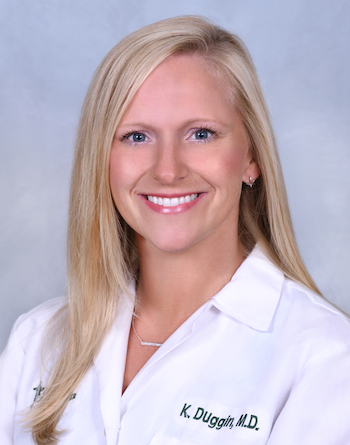Heading Back to the Classroom Means Making Sure Everyone Is in Good Health
September 8, 2022
 Kelly Duggin, MD, a primary care physician at Lakewood Ranch Medical Group and mom of three, provides some helpful information on keeping students well this school year.
Kelly Duggin, MD, a primary care physician at Lakewood Ranch Medical Group and mom of three, provides some helpful information on keeping students well this school year.
COVID-19 and Vaccinations
The COVID-19 virus is still present. Vaccinations are recommended and available for school-age children, so discuss with your doctor.
Talk to your children about vaccinations to alleviate anxiety and so they understand why they are important, as this can make them less anxious about receiving them.
Annual Physical and Medication Needs
Children need annual physicals to ensure school requirements for certain vaccinations and school forms are up to date.
Address medications needed during the school day and food or insect allergies.
Dental exams are recommended at least every 6 months.
Discuss any important healthcare needs with both your child’s teacher and school nurse.
Good Nutrition
Children need three well-balanced meals per day. Fruits and vegetables should be part of the diet, and juice and soda intake should be limited.
Eating meals with family and promoting good nutrition together sets a great model for your children.
Adequate hydration is important, so send your children to school with a water bottle.
Avoid Spreading Germs
Colds, flu and other viruses spread from respiratory droplets and enter the body through the eyes, mouth or nose. Hand washing and covering the nose and mouth when sneezing or coughing is important. Keep your child home if he or she has a fever over 100 degrees, and he or she should remain home until free of symptoms and fever for 24 hours.
Physical Activity and Socialization
Encouraging social time with friends and less screen time outside of school can help your child stay engaged and focus when in the classroom.
Children need 30 minutes of physical activity per day. Going for walks in the evening, riding bikes and playing outdoor games together promotes a healthy lifestyle.
Routine
Children should get eight to 10 hours of sleep per night. It starts with earlier bedtimes and less screen time.
Vaccinations Needed
School age: Vaccinations for ages 4-6 years old include:
- DTap (tetanus and pertussis, also known as whooping cough, booster)
- Polio vaccine
- Second doses of MMRV or measles, mumps, rubella and varicella (chickenpox)
Prior to entering 7th grade or for ages 11-12:
- Tdap (tetanus booster and pertussis)
- First dose of meningitis vaccination (MenACWY)
Ages 11-16:
- HPV vaccination (Gardisil)
Annual flu vaccinations are also important and typically available September of each year.
